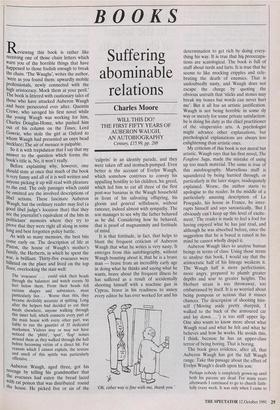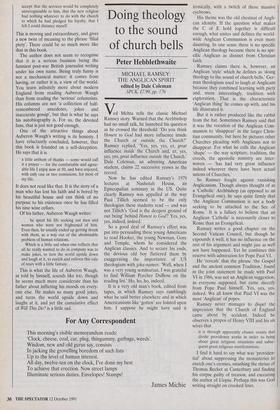BOOKS
Suffering abominable relations
Charles Moore
WILL THIS DO? THE FIRST FIFTY YEARS OF AUBERON WAUGH, AN AUTOBIOGRAPHY Century, £15.99, pp. 288 Reviewing this book is rather like receiving one of those chain letters which warn you of the horrible things that have happened to those foolish enough to break the chain. 'The Waughs', writes the author, were as you found them: upwardly mobile professionals, newly connected with the high aristocracy. Mock them at your peril.' The book is littered with cautionary tales of those who have attacked Auberon Waugh and been persecuted ever after. Quentin Crewe, who savaged his first novel while the young Waugh was working for him, Charles Douglas-Home, who pushed him out of his column on the Times, Lord Gowrie, who stole the girl at Oxford to whom Waugh had presented an onyx bead necklace4 The air of menace is palpable.
So it is with trepidation that I say that my answer to the question which forms the book's title is, No, it won't really.
Before explaining why, however, one should state at once that much of the book is very funny and all of it is well written and anyone picking it up will read with pleasure to the end. The only passages which could be omitted are the involved descriptions of libel actions. These fascinate Auberon Waugh, but the ordinary reader may feel (a good libel judge's locution that) that they are the journalist's equivalent of the bits in politicians' memoirs where they try to prove that they were right all along in some long and best forgotten policy battle. As with so many memoirs, the best bits come early on. The description of life at Paton, the house of Waugh's mother's family, the Herberts, in which he spent the war, is brilliant. Thirty-five evacuees were billeted on the place and lived on the top floor, overlooking the stair well:
The 'evacuees' ... could stick their heads through the balusters and watch events 50 feet below them. From their heads fell curious shapes and substances, most particularly lice... Worse than this, they became devilishly accurate at spitting. Long after the helpers had decided to eat their meals elsewhere, anyone walking through this inner hall, which connects every part of the main house with every other part, was liable to run the gauntlet of 35 dedicated marksmen. Visitors may or may not have noticed the `phlitf, `spuf, 'flop' noises around them as they walked through the hall before becoming victim of a direct hit. For reasons which I cannot explain, the texture and smell of this spittle was particularly offensive.. .
Auberon Waugh, aged three, got his revenge by telling his grandmother that the evacuees had eaten the bread laced with rat poison that was distributed round the house. He picked five or six of the `culprits' in an identity parade, and they were taken off and stomach-pumped. Even better is the account of Evelyn Waugh, which somehow contrives to convey his appalling hostility to his children, his greed, which led him to eat all three of the first post-war bananas in the Waugh household in front of his salivating offspring, his gloom and general selfishness, without rancour, indeed almost with sympathy. The son manages to see why the father behaved as he did. Considering how he behaved, that is proof of magnanimity and fortitude of mind.
It is that fortitude, in fact, that helps to blunt the frequent criticism of Auberon Waugh that what he writes is very nasty. It emerges from this autobiography, without Waugh boasting about it, that he is a brave man — brave from an incredibly early age in doing what he thinks and saying what he wants, brave about the frequent illness he has suffered as a result of accidentally shooting himself with a machine gun in Cyprus, brave in his readiness to annoy every editor he has ever worked for and his `Oh, either way is fine with me, thank you.' determination to get rich by doing every- thing his way. It is true that his preoccupa- tions are scatological. The book is full of stuff about turds and farts. It is true that he seems to like mocking cripples and cele- brating the death of enemies. That is undoubtedly nasty, and Waugh does not escape the charge by quoting the obvious untruth that 'sticks and stones may break my bones but words can never hurt me'. But it all has an artistic justification. Waugh is not being horrible in some sly way or merely for some private satisfaction: he is doing his duty as the chief practitioner of the vituperative arts. A psychologist might advance other explanations, but psychological explanations are always less enlightening than artistic ones.
My criticism of this book is not moral but artistic. Waugh says that his first novel, The Foxglove Saga, made the mistake of using up too much material. The same is true of this autobiography. Marvellous stuff is squandered by being hurried through, or particularly in the later stages, inadequately explained. Worse, the author starts to apologise to the reader. In the middle of a particularly amusing description of La Pesegado, his house in France, he inter- rupts himself and says sarcastically, 'But I obviously can't keep up this level of excite- ment.' The reader is made to feel a fool for having enjoyed what he has just read, and although he was absorbed before, once the suggestion that he is bored is raised in his mind he cannot wholly dispel it.
Auberon Waugh likes to analyse human beings in terms of class. Using those terms to analyse this book, I would say that the aristocratic half of his lineage weakens it. The Waugh half is more perfectionist, more angry, prepared to plumb greater depths and soar to greater heights. The Herbert strain is too throwaway, too embarrassed by itself. It is so worried about being pompous or serious that it misses chances. The description of shooting him- self (`Moving aside pretty sharpish, I walked to the back of the armoured car and lay down... ') is too stiff upper lip. One also wants to know more about what Waugh read and what he felt and what he believes and how he works. He avoids this, I think, because he has an upper-class terror of being boring. That is boring.
The book gives evidence, after all, that Auberon Waugh has got the full Waugh range. Take this passage about the effect of Evelyn Waugh's death upon his son:
Perhaps nobody is completely grown-up until both his parents are dead. For many years afterwards I continued to go to church faith- fully every week. It was only when I came to accept that the services would be completely unrecognisable to him, that the new religion had nothing whatever to do with the church to which he had pledged his loyalty, that I felt I could distance myself.
This is moving and extraordinary, and gives a new twist of meaning to the phrase 'filial piety'. There could be so much more like that in this book.
The author does not seem to recognise that it is a serious business being the funniest post-war British journalist writing under his own name. Being truly funny is not a mechanical matter: it comes from having, or rather it is, a view of the world. You learn infinitely more about modern England from reading Auberon Waugh than from reading the 'serious' columnists. His columns are not 'a collection of half- remembered anecdotes, jokes and inaccurate gossip', but that is what he says his autobiography is. For us, the devoted fans, that is just not good enough.
One of the attractive things about Auberon Waugh's writing is its honesty. I have reluctantly concluded, however, that this book is founded on a self-deception. He says that it is
a little anthem of thanks — some would call it a prayer — for the comfortable and agree- able life I enjoy now at 50, and have enjoyed, with only one or two remissions, for most of my life.
It does not read like that. It is the story of a man who has lost his faith and is bored by his beautiful house and can think of no purpose to his existence once he has filled his nine wine cellars.
Of his father, Auberon Waugh writes:
. . . he spent his life seeking out men and women who were not frightened of him. Even then, he usually ended up getting drunk with them, as a way out of the abominable problem of human relations.
Which is a little sad when one reflects that all he really wanted to do in company was to make jokes, to turn the world upside down and laugh at it, to enrich and enliven this vale of tears with a little fantasy...
This is what the life of Auberon Waugh, as told by himself, sounds like too, though he seems much more considerate than his father about inflicting his moods on every- one else. He makes so many good jokes, and turns the world upside down and laughs at it, and yet the cumulative effect of Will This Do? is a little sad.



























































 Previous page
Previous page